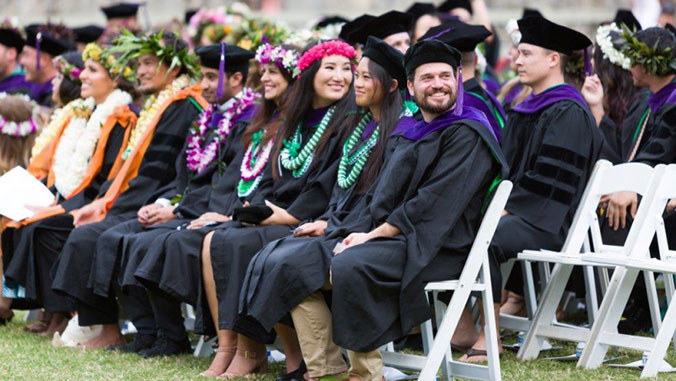
The University of Hawaiʻi at Mānoa William S. Richardson School of Law was ranked as one of the nation’s top law schools, earning an A rating for environmental law and an A- rating for practical training in the latest issue of preLaw magazine.
The UH law school ranked among the top 56 schools in the nation for environmental law. The UH Environmental Law Program (ELP) celebrated its 30th anniversary last year, and continues to be recognized for its diverse, rich education and international participation.
“Although it is gratifying to receive an A grade, we are most proud of the fact that we have continued to develop critical skills for students seeking to practice environmental law in the fields of public interest, public service and private practice, including our efforts to engage students in international environmental negotiations during a critical decade of Earth’s history,” said ELP Director David Forman.
ELP has been recognized annually by multiple publications, including U.S. News & World Report. Prelaw magazine also ranked the UH law school earlier this year for its excellent diversity and international law programs.
Producing practice-ready attorneys
The magazine’s “Best Schools for Practical Training” ranks 70 of the nation’s top law schools known for producing practice-ready attorneys. The UH law school’s rating has risen to A- this year from its B+ rating a year ago for practical training.
The largest weighted metrics in ranking methodology went to clinics, along with externships and simulation courses. Remaining factors considered included moot court, pro bono hours and additional practical training such as legal writing.
Refugee and Immigration Law Clinic Director John Egan cited the authentic experience for students in advocating for justice. “Our clinical program provides law students with real life practice experiences, from client interviewing to brief writing to in-court appearances representing actual clients,” he said. “When we are able to succeed with a case, as some of our recent students have done with some challenging asylum cases, the feeling of accomplishment goes well beyond the grade points earned.”
By providing our students with numerous clinical and other practical experiences, we are teaching the skills that ensure our mission of community service is continuously achieved.
—Nicholas Mirkay
UH law school students receive a variety of experiences that enrich their practical training, with externships as extensions of their law school education, and active participation with the community.
Trisha Y. Nakamura, director of career services and professional development, said, “Practical training is abundant at Richardson. Our clinic, externship, and pro bono programs are rich with diverse opportunities ranging from discussing a bench memo with a judge to interviewing clients on a neighbor island and representing them in court.”
Nakamura also noted the participation with the local community in Hawaiʻi, which allows for both structured and organic relationships with downtown practitioners, judges and legal nonprofits, offering a wealth of skills-based learning on a variety of subject areas.
Associate Dean of Academic Affairs Nicholas Mirkay said, “Since its inception, the William S. Richardson School of Law has been dedicated to the service and betterment of the community. By providing our students with numerous clinical and other practical experiences, we are teaching the skills that ensure our mission of community service is continuously achieved.”
This ranking is an example of UH Mānoa’s goal of Enhancing Student Success (PDF), one of four goals identified in the 2015–25 Strategic Plan (PDF), updated in December 2020.

